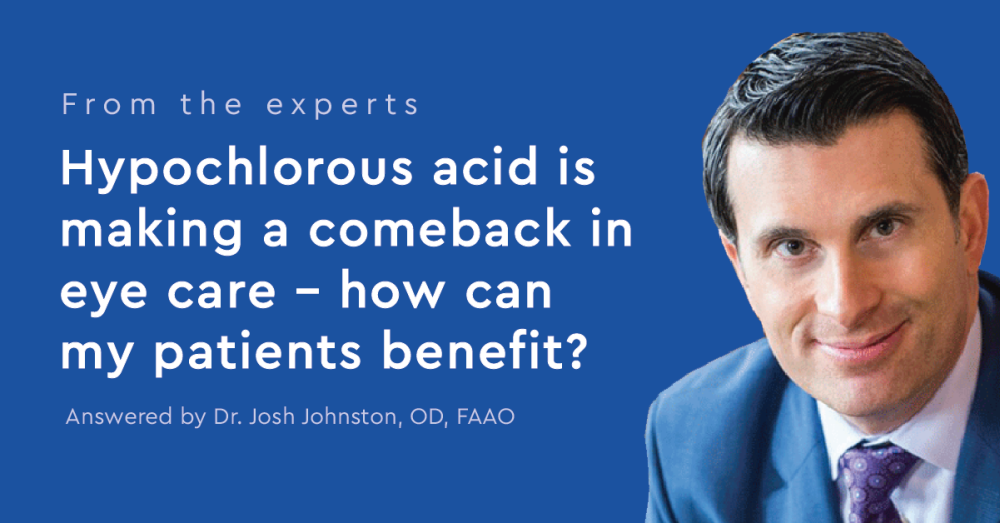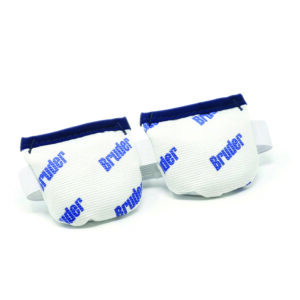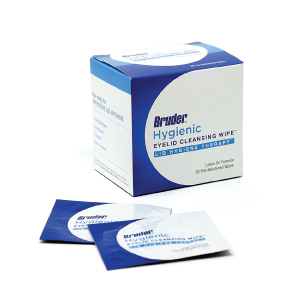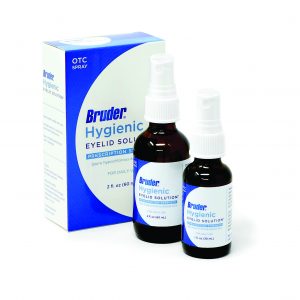
Dr. Josh Johnston, OD, FAAO
Hypochlorous acid has shown high efficacy against a wide range of microorganisms, helping to fight infection, reduce inflammation, control the body’s response to injury, and enhance its natural ability to heal. The question for doctors is what differentiates one formula from the next and when should we recommend these solutions?
When to use hypochlorous acid
Hypochlorous acid has a multitude of uses. I recommend the solution quite frequently and find it to be particularly helpful, especially in the following cases:
- Acute blepharitis Research shows that bacterial load is more than 14 times greater in blepharitis patients compared with controls. As such, hypochlorous acid solution may be helpful if it can bring the number down. Fortunately, it appears to do just that. In one study, hypochlorous acid reduced the bacterial load >90%.
-
Chronic bacterial blepharitis
We recommend hypochlorous acid in patients with a history of chronic bacterial blepharitis since these patients use the product long term and hypochlorous acid is a non-antibiotic antimicrobial, meaning it will not contribute to antibiotic resistance. - Allergy patients Hypochlorous acid is an excellent choice for patients with allergies, dermatitis, or sensitivities to various lid hygiene products. In fact, hypochlorous acid is so safe and gentle that it’s even used to treat drinking water.
EYE CARE TIP
Benefits of hypochlorous acid
- Help fight infection
- Reduce inflammaton
- Control the body's response to injury
- Enhance the body's natural ability to heal
- MGDFor patients who have meibomian gland disease, hypochlorous acid is well paired with warm moist compress therapy as this approach allows for the dual effect of reducing the bacterial burden as well as promoting secretions.
- Marginal/staph limbal keratitis In these cases, hypochlorous acid is used in conjunction with a short course of a topical antibiotic-corticosteroid combo medication in order to continue to keep the bacterial levels at bay. Controlling the bacterial load on the lid will reduce the immune reaction to the antigens that are causing corneal inflammation.
- Rosacea For patients that have rosacea, eczema, dermatitis and other dermatological inflammatory skin conditions, hypochlorous acid is used to decrease some of the inflammation on the lids around the orbit.
- Surgical prep Ocular surface disease can have a significant effect on refractive surgery outcomes and IOL calculations. That’s why it’s so important to prep the eyes before surgery. Increasingly, surgeons and comanaging ODs recommend patients use hypochlorous acid daily in the weeks leading up to surgery.
When choosing a solution, it’s important to look closely at the ingredients. If patients will use the solution long term or are prone to irritation, look for a product that contains no alcohol, oil, sulfates, parabens or added fragrance.
Selecting a solution
Several new hypochlorous products have been released, but they’re not all the same. When choosing a solution, it’s important to look closely at the ingredients. If patients will use the solution long term or are prone to irritation, look for a product that contains no alcohol, oil, sulfates, parabens or added fragrance.
Shelf life is another key differentiator. A product’s shelf life can be years in some cases. However, once a bottle of pure hypochlorous acid is opened, it becomes less stable and begins to degrade. This can be overcome by adding preservatives and additional ingredients, but must be weighed against the deleterious effects that these additives may have, especially with long-term use.

Ready to improve your patients lid hygiene routine?
The Bruder family of eye care products , including Bruder Hygienic Eyelid Solution, are available for purchase online or by contacting Bruder customer care at 888-827-8337.
References
1 Stroman DW, Mintun K, Epstein AB, et al. Reduction in bacterial load using hypochlorous acid hygiene solution on ocular skin. Clin Ophthalmol. 2017;11:707–714. Published 2017 Apr 13. doi:10.2147/OPTH.S132851
2 Bezza Benkaouha I, Le Brun C, Pisella PJ, Chandenier J, Lanotte P. Bacterial flora in blepharitis. J Fr Ophtalmol. 2015;38(8):723–728.
3 Stroman DW, Mintun K, Epstein AB, et al. Reduction in bacterial load using hypochlorous acid hygiene solution on ocular skin. Clin Ophthalmol. 2017;11:707–714. Published 2017 Apr 13. doi:10.2147/OPTH.S132851
4 Harsch AG, Stout N, Lighthizer N. Beat the Blepharitis Blues. Review of Cornea and Contact Lenses. October 2016.
5 Ono T, Yamashita K, Murayama T, Sato T. Microbicidal effect of weak acid hypochlorous solution on various microorganisms. Biocontrol Science. 2012;17(3):129-33.
6 Debabov D, Noorbakhsh C, Wang L, et al. Avenova with Neutrox (pure 0.01% HOCl) compared with OTC product (0.02% HOCl). NovaBay Pharmaceuticals:1-5.
7 Wang L, Bassiri M, Najafi R, et al. Hypochlorous acid as a potential wound care agent: part I. Stabilized hypochlorous acid: a component of the inorganic armamentarium of innate immunity. J Burns Wounds. 2007;6:e5. Published 2007 Apr 11.
8 Dang V. Sizing Up Anti-inflammatories in Dry Eye Disease. Review of Optometry. April 2018.
9 Romanowski E, Stella N, Yates K, et al. In Vitro Evaluation of a Hypochlorous Acid Hygiene Solution on Established Biofilms. Eye Contact Lens. www.ncbi.nlm.nih.gov/pubmed/29369234. Accessed March 25, 2018.







